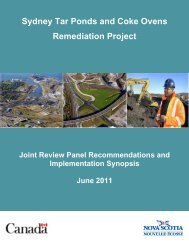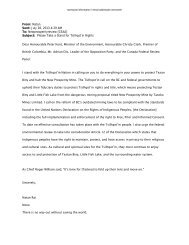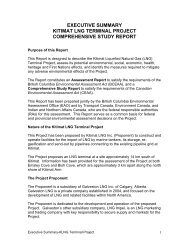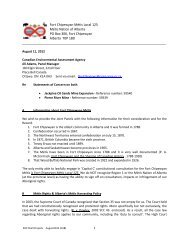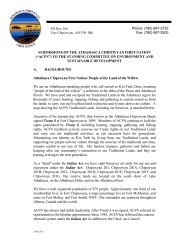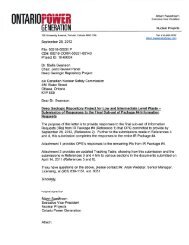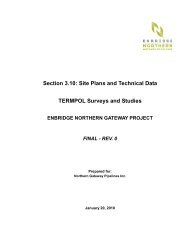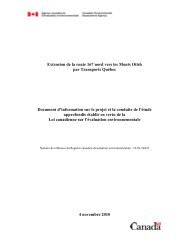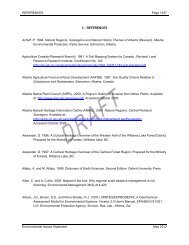Report - Agence canadienne d'évaluation environnementale
Report - Agence canadienne d'évaluation environnementale
Report - Agence canadienne d'évaluation environnementale
You also want an ePaper? Increase the reach of your titles
YUMPU automatically turns print PDFs into web optimized ePapers that Google loves.
Chapter 6 Social acceptance of the project<br />
Between fairness and solidarity<br />
The Panel was in a position to take the full measure of the extent of opposition to the<br />
project in the area under consideration. This included the genuine concerns and<br />
anxieties noted among many citizens about their security, their quality of life and the<br />
value of their assets in relation to the project’s potential risks. The Panel also<br />
observed concerns among many residents of Lévis, Beaumont and île d’Orléans<br />
regarding the possible impacts of the project on the area’s landscape and the region’s<br />
cultural heritage. By the same token, the Panel also took note of the widespread<br />
support, both regionally and nationally, for the project on account of its economic<br />
benefits for the majority. As far as its compatibility with the character of the area<br />
chosen for its construction is concerned, the Panel was able to fully assess<br />
reservations expressed by participants both from the south shore and île d’Orléans.<br />
Once all of this is taken into account, the obvious dilemma related to the project is echoed<br />
in the two values entrenched in Quebec’s Sustainable Development Act, namely, fairness<br />
and solidarity. Opposition by a majority of the community living in proximity to the project<br />
is mainly based on apprehension about risks and the fact that they would be the first to<br />
bear the brunt of potential consequences. From this standpoint, an argument based on<br />
the principle of fairness would support giving predominant weight to this community’s<br />
position in regard to the acceptability of the project.<br />
However, extending this approach on a society-wide basis would have the<br />
disadvantage of making the conduct of public affairs difficult, if not impossible. This is<br />
because the significance of socioeconomic activities (facilities and institutions) to the<br />
greater public interest could outweigh local or regional resistance.<br />
By the same standard, national, regional and local support for the project derives its<br />
legitimacy from the advantages anticipated in terms of employment, spin-offs, and<br />
economic development. From this viewpoint, the principle of solidarity could be<br />
invoked in support of the project. That said, applying the principle of solidarity must<br />
also take into account the principle of fairness in regard to specific regional and local<br />
interests and concerns.<br />
It is certainly not possible to ensure equal sharing of the advantages and<br />
disadvantages of a project at all times and in the society as a whole. But in a<br />
Rabaska Project – Implementation of an LNG Terminal and Related Infrastructure 173



